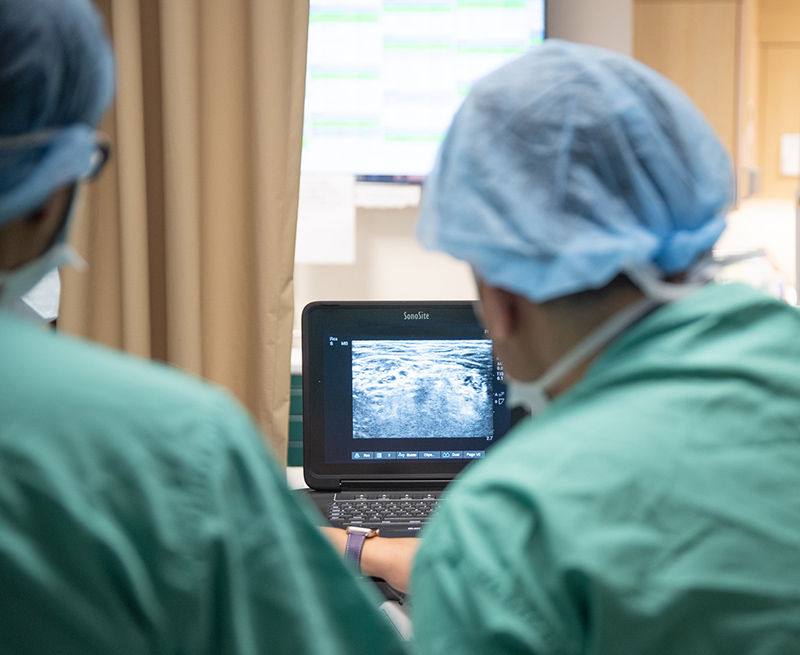The Outpatient section is responsible for the provision of anesthetics and acute pain management for approximately 8,000 patients per year in 8 outpatient operating rooms. We perform about 5,000 general anesthetics, 2,000 sedation anesthetics, and 1000 regional anesthetics. Our caseload is primarily a mix of ophthalmology, ENT, general surgery, plastic surgery, and orthopaedic surgery. We have a busy hand surgery caseload during which you can learn efficient orthopaedic regional anesthesia. In addition, we generally perform shoulder, knee, and ankle/foot surgery on a daily basis. We also have a busy ENT Voice Disorder service, and you will be exposed to cases in which specialized airway techniques with Total Intravenous Anesthesia and Processed EEG monitoring is used. We provide all of the anesthetics for ocular procedures, all the way from conscious sedation on healthy patients to deep sedation for bulbar blocks to general anesthetics on ASA 4 patients.
Junior Resident Rotation
The Ambulatory Surgery rotation has been established to give the resident a concentrated exposure to the principles and techniques of anesthetic care for the patient undergoing common outpatient surgical procedures in a hybrid outpatient setting. The rotation is for a minimum of a one-month duration during the CA-1 or CA-2 year. A variety of anesthetic techniques will be employed, along with post-operative analgesic strategies, and management of postoperative nausea for the ambulatory patient will be learned. A major emphasis will also be placed on regional analgesia use in the ambulatory surgery setting.
Advanced Resident Rotation
We also have a CA-3 Advanced Rotation during which you will gain experience in areas you were not exposed to during your first two years. The senior-level resident spending elective time at the ambulatory surgery center will be expected to expand the knowledge and technical base of the principles learned as a CA-2 resident. The resident will be expected to perform at a level that reflects mastery of all aspects of the administration of anesthesia in the outpatient setting. CA-3 residents on their Advanced Rotation will have the opportunity to spend time in the outpatient surgical center at the main hospital campus as well as at Wake Forest Baptist Health's standalone community-based Ambulatory Surgical Center and the Bermuda Run campus where our elective joint surgery takes place.
Objectives and Responsibilities
- Help administer and manage regional techniques in an efficient, and at times, multitasking manner.
- Administer pure regional anesthetics using traditional bedside techniques without ultrasound as a complement to what you learn in the Regional Anesthesia rotation
- Gain exposure to more specialized anesthetic techniques including ENT airway cases with TIVA/BIS
- Learn how to provide deep sedation for ophthalmologic blocks
- Learn how to more fully and efficiently assess the patient who has undergone general or regional anesthesia for outpatient surgery for adequacy of recovery and fitness for discharge from the outpatient surgery center by:
- Learning the principles of the post-operative management of patients having surgery in the outpatient setting, specifically:
- how to manage postoperative pain while minimizing sedation
- how to manage postoperative nausea and vomiting in the ambulatory patient
- how to manage the postoperative care of the patient who has undergone regional anesthesia in the outpatient setting
- Learn cost-containment considerations for the administration of anesthesia in the outpatient setting.
- Become familiar with the administrative aspects and functioning of an outpatient surgery center
- Learning the principles of the post-operative management of patients having surgery in the outpatient setting, specifically:

In summary, during the Advanced Rotation, residents will be given more responsibility for placing preoperative regional anesthetics in the holding room and helping to manage and discharge postoperative patients to home or our 23-hour observation unit.
For all residents, residency-level study guides with hyperlinks to online resources are issued at the beginning of the rotations and I will review those guides with you prior to the end of your rotation.
Additional information can be obtained by contacting Dr. Deborah Whelan, Ambulatory Anesthesia Rotation Director, at 336-716-4498.
